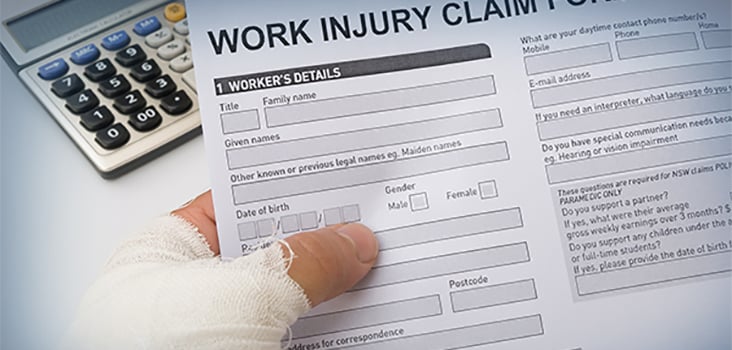
5 Things Small Businesses Need to Know About Workers' Comp
Workers’ compensation insurance was created to protect employees and help employers cover the cost of workplace injury care, but many small business owners think it’s just an extra—and unnecessary—cost for their company. Some employers believe that injuries only happen in high-risk industries like manufacturing and construction, but employees can be injured in any industry. Although construction is the industry with the highest claims, industries such as transportation, finance/insurance, and professional services also have high-cost claims.
Knowing the ins and outs of workers’ compensation is essential for the safety and success of any small business. Before you get tangled in the web of lawsuits and lost productivity, get familiar with these five things you should know about workers’ compensation as a small business owner.
1. There’s a 50% Chance Your Business Will Get an Injury Claim in the Next 10 Years
You may think that because your business is small, it’s very, very unlikely that you’ll ever deal with an employee injury. Not true. Hartford’s claims data analysis found there’s a 50% chance that a small business will experience a claim in the next 10 years.
Even if you only have one employee, your small business could still be liable for medical bills and lost wages if they are injured while working. The financial consequences of a workplace injury are a serious matter, and accidents happen more often than you may think.
Property Casualty 360° considers a scenario where a business only employs three people. One injured person means the business is missing one-third of its workforce. Even though the employer is concerned about employee health, the work doesn’t stop. Considering the risks, it’s essential to have the financial security of a workers’ compensation plan, as well as a quick return-to-work program to reduce lost productivity and costs.
2. Every State Has Different Workers’ Compensation Requirements
Don’t dismiss workers’ compensation until you know your state’s laws and legal obligations for covering employees. No two states have exactly the same regulations.
Most states require employers to cover any full-time or part-time employees. In some states, like Florida and South Carolina, you’re only expected to carry workers’ compensation coverage if you have four employees or more. Texas is the only state where coverage is optional, but you can still be held liable for employees’ occupational injuries. There are several states that offer exemption for certain types of employees, including farm workers, domestic employees, and seasonal workers.
State laws may also vary in how much coverage is required.
Check out this link to see a state-by-state comparison of workers’ compensation requirements.
3. Where Can Small Businesses Get Workers’ Compensation Insurance?
There are two ways you can get workers’ compensation insurance: a private insurer, or your state’s workers’ compensation fund.
- Private Insurer: Working with a private insurer lets you choose the best option for your employees’ needs. There are typically several options available, and the competitive nature of the private sector gives you the power of comparing prices and coverage. Working with an agent also helps you choose and understand the coverage that offers the best value.
- State’s Workers’ Compensation Insurance Fund: Depending on the state, this can be required, optional, or not even exist. If a small business can’t get coverage from private insurers, you’re guaranteed a policy from these funds if it’s an option. Twenty-two states have their own competitive workers’ compensation fund, which supply approximately 25% of all worker’s comp policies. Visit this link to see a list of competitive state funds in the U.S.
To make things easier, you might also consider partnering with a Professional Employer Organization, or PEO. PEOs partner with companies to provide comprehensive HR outsourcing. This co-employment arrangement assists with employer responsibilities like HR, employee benefits, payroll, and regulatory compliance. Having an experienced partner to take care of workers’ compensation can be a major time saver.
4. How OSHA Affects Small Businesses
While workers’ compensation is regulated by the states, the Occupational Safety and Health Administration (OSHA) also has federal regulations for workplace injuries—and these regulations can have just as big of an impact on your business.
OSHA ensures that employees have access to medical and exposure records, personal protective equipment, hazard communication, access to file complaints, and notices about workplace health and safety. Unless required by another federal department, small businesses with 10 or fewer employees don’t have to keep OSHA records, but you’re still expected to report employee fatalities and hospitalization.
5. Simple Ways to Reduce Workplace Injury
Besides covering employees with workers’ compensation insurance, the best way to keep the workplace safe is by enforcing safety rules and training.
There are several ways to maintain a safe workplace:
- Perform regular safety inspections to identify and remove existing hazards
- Keep the floor clear of any material that could cause a worker to trip
- Provide employees with necessary protective gear
- Schedule thorough safety training for new employees, onboarding, and have refreshers for seasoned employees
- Provide open spaces and clear access for equipment and materials that need lifting or handling
- Display posters, brochures, etc. with safety reminders and tips
If safety rules are enforced and followed, a business can reduce the risk of workplace injury--and earn discounts on premiums.
And if an employee does get hurt? It’s a good idea to work with an occupational medicine provider. A good provider will help you find the best injury care solutions for your workforce and help your employee get quickly—and safely—back to work.
As a small business owner, you want your employees to have a safe environment to stay productive. Keep informed on all these factors for workers’ compensation to maintain a safe and successful business.



